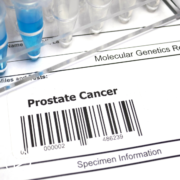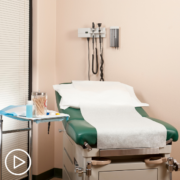Understanding Recommended PSA Screening Age and Frequency In Prostate Cancer
Understanding Recommended PSA Screening Age and Frequency In Prostate Cancer from Patient Empowerment Network on Vimeo.
What do prostate cancer screening guidelines recommend for PSA screening age and frequency? Expert Dr. Yaw Nyame with the University of Washington explains different guidelines and patient groups who should receive PSA screening sooner or more frequently than the general population.
See More from [ACT]IVATED Prostate Cancer
Related Resources:

How Can Prostate Cancer Stigmas and Misconceptions Be Addressed? |

|

What Impact Does Advanced Prostate Cancer Have on Lifestyle? |
Transcript:
Lisa Hatfield:
And, Dr. Nyame, can you comment on the recommended age of first PSA screening and then the subsequent screenings, the frequency of subsequent screenings.
Dr. Yaw Nyame:
Yeah, so there are a lot of different guidelines out there, unfortunately that don’t all agree, the most current ones from the American Neurologic Association and the American Cancer Society are rooted in the best available evidence and both recommend that high-risk populations which include people of African ancestry, individuals who have strong family histories of prostate cancer, so strong usually means first degree relative, grandfather, father, brother, and it’s important to remember that there’s crossover, so it’s not just prostate cancer, but if breast cancer runs in the family or colon cancer runs in the family, or cancers in general, that can put you in a high-risk category that those individuals should consider screening starting at age 40. The frequency is debatable. We have a study that says that every year for a really high-risk population and PSA test every year, the guidelines will say every two years at the most.
And then it’s important to stop screening around age 69 to 70, especially if your PSA numbers have been really stable, because we can’t over-detect cancers, meaning finding cancers that are going to affect your natural life and that risk goes up if we continue to test unnecessarily as men age, and so somewhere in their early to mid-70s, you definitely want to stop testing.
The most important thing is what is an abnormal PSA, and that varies by your age, so if you have a PSA of 1 when you’re 40, that’s alarming, and that would prompt me to say, “Hey, let’s test every year, and if it gets above 2.5 in the next 5 to 10 years, we’re going to do a biopsy.” You’ve got a PSA of 1, at age 70 that’d be below PSA for your age. And so we use these numbers three or four, but it’s a spectrum. What I would say is, don’t let your PSA get above 10 before you do something regardless of your age, so if you see a pattern of increase certainly as you’re getting above three, four, five and especially if you’re a younger person, you definitely want to make sure you get connected to a urologist.






